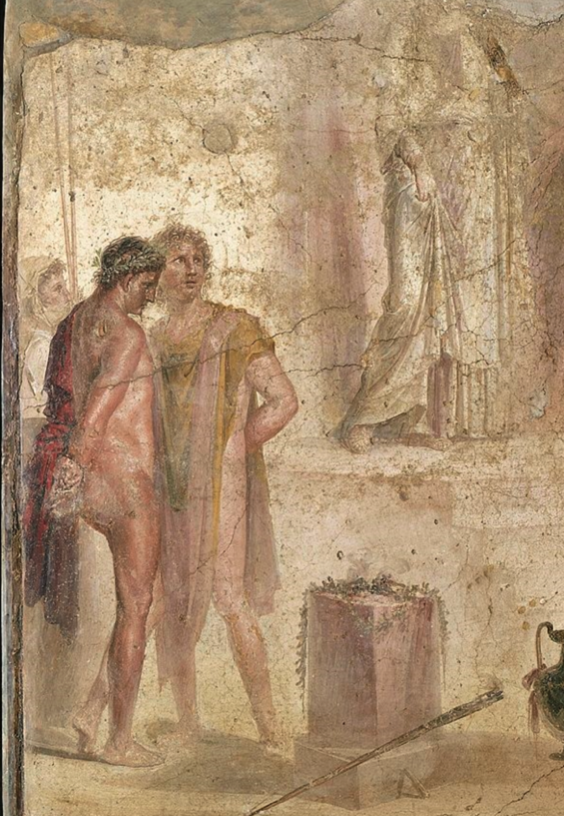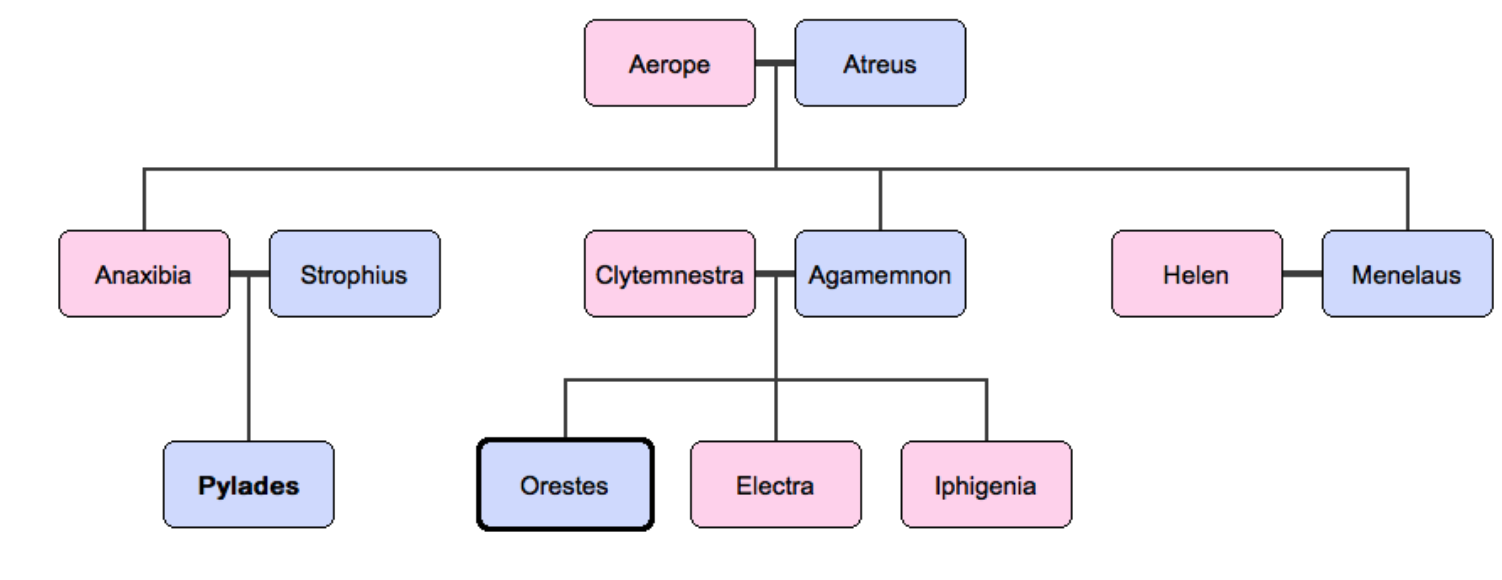2 Fābula dē Oreste et Pylade, duōbus amīcīs, quī amīcitiam magnam habērent
This fabula contains only ~ 100 unique words and almost all of these are very common — apart from proper names and a handful of words you should be able to determine from context or English derivatives.

Orestes was the only son of Agamemnon, the king of Mycenae and leader of the Greek expedition against Troy. Pylades convinced Orestes to avenge Agamemnon after he is killed by his wife (and Orestes’ mother) Clytemnestra. After Orestes was driven mad, Pylades stood by him and protected him. Eventually the pair wind up in the distant kingdom of Tauris, whose inhabitants had the custom of sacrificing all foreigners to Artemis.
[1] Ecce hominēs: Orestēs et Pyladēs. [in imaginē →]
Orestēs Pyladēsque vīvunt in terrā Graecōrum.
Hī hominēs sunt amīcī bonī.
Hī amīcī amīcitiam magnam habent.
Orestēs est fīlius Agamemnonis rēgis et Clytemnestrae.
Nōmen patrī Orestae est Agamemnōn.
Nōmen mātrī est Clytemnestra.
Pyladēs est fīlius Strophiī rēgis et Anaxibiae, quae est soror Agamemnōnis.

[2] Ubi Orestēs est parvus, Clytemnestra eum mittit ex terrā suā ad terram Strophiī rēgis. In terrā illā Orestēs fit amīcus Pyladae. Omnēs hōs parvōs amīcōs amant. Cum Orestēs cum Strophiō, Anaxibiā, Pyladēque vīvit, Clytemnestra māter Agamemnonem patrem occīdit et dīcit “sīc semper omnī rēgī malō!” Cum Orestēs Pyladēsque dē factō malō audiunt, Orestēs cōnsilium capit et cōnsilium amīcō dīcit, “Clytemnestra est māter mea; illa tamen nunc est hostis mihi.
Nōs, Ō Pyladēs, iam dēbēmus ad terram Clytemnēstrae īre et nōs iam dēbēmus Clytemnestram occīdere! Dabō enim mortem mātrī meae Clytemnestrae. Hāc manū occīdam mātrem meam!”
[3] Orestēs et Pyladēs ex terrā Strophiī fugiunt et veniunt ad terram Clytemnēstrae. In terrā Clytemnēstrae sorōrem Orestae inveniunt. Nōmen sorōrī Orestēae est Ēlectra. Ēlectra Orestem frātrem vīdit. Orestēs cum Pyladē ad Clytemnestram ā Ēlectrā dūcitur. Sed eō tempore Orestēs mortem Clytemnēstrae petere nōn vult. Orestēs dīcit, “Quī mortem mātris suae petere vult? Ego mortem mātris meae petere nōn possum!” Sed tunc Pyladēs amīcō dīcit, “Clytemnestra tamen vīvere nōn dēbet! Nōn sine causā bonā venīs. Cape virtūtem manū tuā! Tū dēbēs mortem hostis magnā cum virtūte petere!” Tum Orestēs amīcum suum audit et mortem mātrī fert. Amīcī Clytemnēstram occīsam vident.
[4] Clytemnēstrā occīsā, Pyladēs domum it. Sed Dīrae Clytemnēstram occīsam vident. Nam Dīrae sunt deae quae mātrēs amant. Dīrae multae Orestem sequuntur et animum ēius malum faciunt. Cum animus fit malus, Orestēs domō fugit et per multās terrās aliās it ad templum Apollōnis. Dīcit, “Ō Apollō, cum mortem mātris petīverim, nunc vīvere nōn possum?” Apollō dīcit Orestem dēbēre templum Diānae in terrā aliēnā petere et in terrā illā imāginem deae capere ut hanc imāginem in terram Graecōrum dūcat. illō tempore ubi Pyladēs audit Dīrās Orestem sequī et amīcum suum per terrās aliās īre, Pyladēs ex terrā suā fugit et cum Oreste sē agit.
[5] Amīcī bonī ad terram novam venientēs ab hominibus aliēnīs captī sunt. Ductī sunt ad ducem aliēnōrum quae erat fēmina. Dux fēmina, audiēns captōs amīcōs esse Graecōs, vēnit ad eōs. Illa dīxit, “Ō Graecī, potestis īre ad terram Graecōrum, sī epistolam ad frātrem meum dabitis.” Ante Pyladēs dīcere poterat, Orestēs dīxit, “sī tū mē amābis, tū nōn manēbis sed fugiēs et epistolam ad terram Graecōrum ferēs.” Pyladēs dīxit sē sine amīcō suō nōn īre sed sē in terrā aliēnā manēre.
[6] Tum dux fēmina dīxit, “Spērō meum frātrem habēre talēs amīcōs. Nōmen enim mihi est Īphigenīa. Frāter mihi est Orestēs ille quī in terrā Graecōrum vīvit.” Amīcī nihil dīxērunt. Tantam rem novam audīvērunt! Tum Pyladēs dīxit, “Ō fēmina bona, frāter tuus nōn in terrā Graecōrum est. Sed ante tē! Orestem tuum enim invēnistī! Nam hic homō, quī est amīcus meus… est frāter tuus!” Fēmina nihil dīxit. Tantam rem novam audīvit! Tum omnēs—Orestēs et Pyladēs et iam Īphigenīa—ex terrā illā fūgērunt ut ad terram Graecōrum cum imāgine Diānae venīrent. Orestēs et Pyladēs sīc semper amīcitiam magnam habēbant.
Interrogata
- Would you rather have a single friend with whom you share an intense and profound mutual friendship or many friends with whom you are friendly but not intimately so.
- Can you think of postclassical or contemporary versions of Orestes and Pylades?

